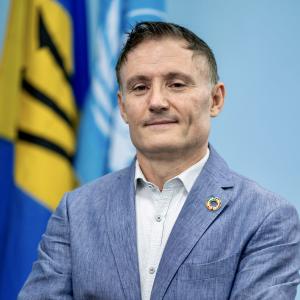ACKNOWLEDGEMENTS:
• The Hon. E.P. Chet Greene, Minister of Foreign Affairs, Immigration and Trade,
• Representatives of Government
• Leaders and representative of migrants
• My colleague Patrice Quesada, Representative of the IOM for the Caribbean and other fellow UN colleagues
• Ladies and gentlemen
Good afternoon and Happy International Migrants Day in advance!
I am happy to join you all today for this important panel discussion in recognition of International Migrants Day. Thank you to IOM for organizing this with the Government of A&B.
I understand that the festivities will continue Sunday with a multi-cultural Family Fun Day under the theme “Nations and Celebrations” where the best in music, fashion, cuisine, art and craft, and other cultural aspects of migrant groups in Antigua will be celebrated.
Every year on December 18th, the world pauses to acknowledge the vital contributions of migrants to their new homes and to recognize the challenges they face.
Migrant rights are human rights. They must be respected without discrimination – and irrespective of whether their movement is forced, voluntary, or formally authorized.
As we know, migrants, especially those who may be most vulnerable, due to age, disability, gender or other grounds, can see their rights at risk. Today is a reminder to all to uphold human rights for all, wherever they are, and they come from.
This principle of equality and non-discrimination resonates deeply with our esteemed panellists, people who chose Antigua and Barbuda as their home to build a better future for themselves and their families. In turn, they have enriched their new communities in countless ways.
Indeed, Antigua and Barbuda has a rich history of migration – as a destination country and as an origin country. This is a testimony to the high quality of life, citizens and residents of Antigua and Barbuda enjoy; a testimony to the tradition of hospitality; but also, a recognition of the contribution that migrants have made to the socio-economic development of this country.
Unfortunately, sometimes and in many places around the world there is stigma associated with migration; some ignore the many valuable roles that migrants and their families play in society.
Dear participants,
In fact, migration is a powerful driver of economic growth, dynamism, and understanding.
Consider this: remittances to the entire region of Latin American and Caribbean from its diaspora reached a staggering 156 billion dollars in 2023. In the Caribbean alone, this translates to 18.2 billion dollars, a sum nearly three times the combined GDP of all OECS countries. In the case of Antigua and Barbuda, more than 150M (World Bank) in remittances was received over the pandemic years (2020-2022) providing a vital lifeline for the most vulnerable. This underscores the economic power of migration and its direct contribution to local economies.
The positive impact goes far beyond their financial contributions. Migrants also bring diverse experiences, perspectives, and skills to the communities, fostering innovation, creativity, and cultural exchange.
Furthermore, Caribbean nations face a critical reality: shrinking populations due to lower birth rates, and increased aging. By 2050, many countries will have fewer people of working age, which can adversely impact all sectors, including healthcare, social protection and infrastructure. But, if we manage migration well, it can be a powerful tool to help us deal with these challenges.
In my role as UN Resident Coordinator for the Eastern Caribbean, I've witnessed first-hand how migrants of all ages play a key role in achieving the Sustainable Development Goals. Migrants fill important jobs gaps in healthcare, agriculture, and tourism, making sure these services keep running smoothly. And on top of that, they strengthen human capital and diversity to school, sports and parks.
Strengthening rights-based pathways for migration is critical to advance the Sustainable Development Goals, and address labour market shortages. And we need greater international support for investments in countries of origin to ensure migration is a choice, not a necessity.
I believe that migration, when approached strategically, can significantly contribute to regional prosperity. And to be effective, it is also essential to develop campaigns to address stigma, enhance inclusion and tolerance, with a view to reduce social tensions if needed.
I am certain that there are many opportunities to learn from successful examples of integration and of building joint solutions to existing challenges, such as those our panellists will share today.
By embracing migration as an enriching opportunity, we can address the twin challenges of the climate crisis and population decrease. Through open minds and collaboration, we can create a future where migration strengthens communities and fuels a prosperous Caribbean.
I look forward to outcomes of today’s discussions, as well as the other activities planned over the weekend. Learning from groups of migrants, who now call this beautiful country home, and to highlight best practices in Antigua's experience.
Thank you!









